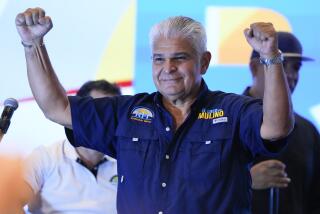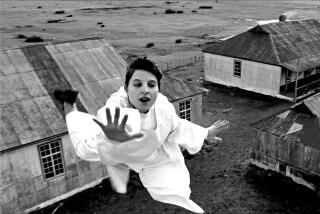Chile Wins
- Share via
Everyone who cherishes democracy can take hope from the results of Wednesday’s plebiscite in Chile. After 15 years of military dictatorship, a majority of that nation’s voters decided to return to the democratic traditions that once made them the envy of their Latin American neighbors. In voting to reject the presidential candidacy of Gen. Augusto Pinochet, Chileans showed that they have not forgotten what a free and vibrant nation Chile was before 1973, when Pinochet and other military men ousted the Marxist, but democratically elected, government of President Salvador Allende.
Hundreds, perhaps thousands, of people died in the coup, including Allende. Thousands more were arrested, tortured and exiled in its aftermath, as Pinochet consolidated his power. Some of Pinochet’s opponents were even pursued into exile by the dictator’s thugs and assassins. But for all of Pinochet’s attempts to intimidate them, the spirit of the Chilean people was not broken by his dictatorship. When they were finally given the chance to vote yes or no on granting Pinochet an eight-year term as their president, they rejected him.
Although they have soundly repudiated the dictator, Chileans unfortunately still must put up with him for another year. The Chilean constitution under which Wednesday’s plebiscite was held requires that Pinochet remain the nation’s head of state until the groundwork can be laid for a presidential election in 1989. It also permits the 72-year-old general to remain the commander of Chile’s army, the largest branch of the nation’s armed forces. So he will remain a highly visible and influential actor in the political drama that will now begin to unfold in Chile.
Pinochet clearly had some support among Chileans, particularly those business leaders who profited from his regime’s free-market economic policies and those in the middle class who feared that democracy meant a return to the sometimes chaotic days of Allende. There are also troubling indications that Pinochet is not the only military leader unhappy at the prospect of returning power to civilians. There were reports in the final days before Wednesday’s voting, when it became apparent that the anti-Pinochet forces could win, that the Chilean government was preparing to cancel the plebiscite. Those reports were taken seriously enough in Washington to prompt the normally cautious spokesmen for the U.S. State Department to express serious concern about them, a clear public warning to the Pinochet regime from the Reagan Administration.
For all of the problems that it has dealing with other Latin American nations, the Administration showed admirable firmness and consistency in pushing Pinochet to allow a return to democracy in Chile. That policy must now be maintained, and strengthened where possible, because the transition back to full democracy in Chile will not be easy. The United States and the rest of the world’s democractic governments must do all they can to encourage the process.
But the main responsibility for solidifying Chile’s democratic revival lies with the opposition forces that waged the successful campaign against Pinochet. A coalition of 16 political parties ranging from right-of-center to the left, they displayed remarkable unity and imagination in campaigning. With the exception of a few radical leftists who hinted at violence if the dictator was not voted out, the opposition showed restraint in a campaign that did not so much attack the dictator as it tried to remind Chileans of the traditions they are justly proud of. That same restraint must now be maintained as the opposition forces begin to negotiate an orderly transition of power with Pinochet and other military leaders. In the euphoria of victory, they must not forget that Pinochet and his cronies still have the guns, and have shown that they are willing to use them. By continuing to conduct themselves with quiet dignity, and by continuing to remind Chile’s people of the best in their history, the opposition can build on the moral authority that Wednesday’s vote has given them--a moral authority that can force even a proud dictator like Pinochet to surrender.
More to Read
Sign up for Essential California
The most important California stories and recommendations in your inbox every morning.
You may occasionally receive promotional content from the Los Angeles Times.













